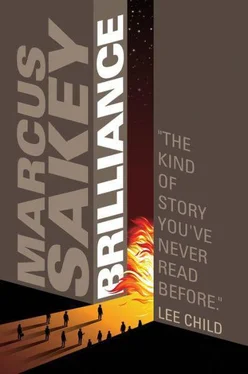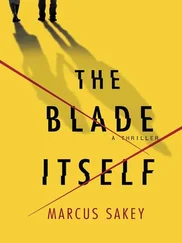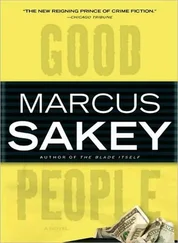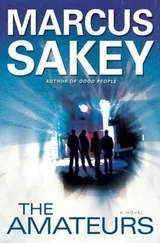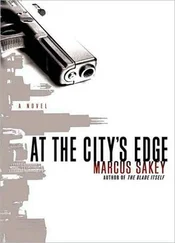It wouldn’t be at DAR headquarters. Too exposed. Plus, if Peters were burned, the agency might be closed to him.
Which was a relief. If it had been at the office, there was no chance Cooper could reach it. Might as well have been on the moon. It was an odd synchronicity, but if Peters needed his insurance policy, he’d likely be in the same position Cooper was, a renegade hunted by all.
The same logic ruled out Peters’s house. Or any property in his name: his lake house, his car, any athletic clubs.
Of course, this was the director of Equitable Services. He could easily have false documents. But owning property under a false identity was a big risk. Property meant a paper trail, and a paper trail could be followed. Especially one that smelled like corruption.
Okay, what about registering a safety-deposit box under a fake identity? Minimal chance of discovery. On the other hand, banks were closed at night and on the weekend. That delay could mean the end.
One of the safest ways to hide something was in a hotel. Check into a room, bring a few minimal tools. Remove a baseboard or the cover to a heating vent, and hide gear there. As long as Peters kept half an eye on the hotel, made sure that it wasn’t about to undergo major renovations, it would be a perfectly anonymous hiding place.
Thing was, that presented the same difficulties in retrieval. Unless you rented the room in perpetuity, which negated the point, you couldn’t count on being able to get back to it at a moment’s notice. A hotel would happily book you in a specific room with a little notice, but if it was occupied, things got complicated. Yes, Peters could break in, but it would be clumsy, and Peters abhorred clumsy tactics.
A lawyer? Trusted family counsel, retained for years. That same person could be instructed to release it if Peters disappeared…
…only, this wasn’t a private eye movie. Peters didn’t want the threat of vengeance after his death; he wanted to protect himself. And no employee could be trusted, not with something this important.
Out the window, the clouds had broken into clumps, the gold-green quilt of Nebraska or Iowa below him, that boxy and startlingly regular geometry only visible from above. He wished he had someone to bounce this off of, Bobby Quinn, or Shann—
Put her out of your head.
Which was like telling himself not to think about elephants. Immediately he was flashing back to the previous night, the way she had tasted, that mental Polaroid of her rocking back, sweat-slick skin outlined against the Milky Way. Had that been part of her mission, too? Smith had planned everything else, had plucked him up from an El station in Chicago and brought him to Wyoming. Was it possible that he’d sent Shannon to seduce him? To plant the seed of a mission, and then comfort him, tie Cooper to them?
It was possible. He didn’t want to believe it, tended not to—he thought he knew Shannon, couldn’t see her going with that—but it was possible. She could have been step two after all.
“Even if there is a step two, step one was tell you the truth.” Her words in his head. And if she had lied to him, well, he’d lied to her, too. The whole time they’d been together, it had been under false pretenses. But though he’d been lying to her about his mission, he hadn’t been lying about who he was. Maybe she hadn’t either. Maybe, like him, she was both a pro and a person, both a job and a life. Had it been a mistake not to include her? Until her, Cooper had never worked with anyone who could match him. And she would be a huge asset if he had to sneak into…
Enough. It was done.
So it wouldn’t be at a hotel, wouldn’t be with a lawyer. How about a friend, or a family member? Not his daughters, but a brother, say, or an old school friend. Someone who could be counted upon, who would never willingly betray him.
Problem was, willingly. If Peters was in trouble, then his friends and family were, too. If someone suspected a friend had what they were after…well, normal people didn’t resist torture.
Funny to be back on a private jet. It had started this way, the jet returning from San Antonio, where he’d followed Alex Vasquez. Alex Vasquez, who had told him a war was coming. He’d had no idea how right she’d been. He wondered, idly, if she had.
Cooper yawned. The seat was comfortable, and the last days had been long. The few hours of sleep he’d gotten had been on the cold ground, and not much good.
Okay, so figure it out. This is what you do.
Only, as always, his gift was something he couldn’t control. Sometimes it made a wild intuitive leap that he knew was true before he had proof. Sometimes it just lay coiled and quiet, processing at its own speed.
Still, he had a sense that he was close, that he had the data he needed, he just needed to look at it from the right vantage point.
Tell you what, self. Figure this out, and you can go to sleep.
Peters’s insurance would be geographically close. It would be somewhere he could get to it night or day. Somewhere that no one would stumble on it, ever; where the risk of that was essentially zero. It would not be in his name, or anywhere someone would think to look. Getting to it wouldn’t require the help of another person.
What kind of place was essentially unchanging, always available, perfectly secure, and close at hand?
Cooper smiled.
Two minutes later, he was sound asleep.
Full circle. Funny how life had a way of doing that.
He wasn’t just back in DC; he was back in Georgetown, a couple of blocks from his old apartment, on his old jogging route. Cooper could picture that version of himself, a faded army tee clinging to his soaked chest as he rounded this stretch of R Street. This had been his favorite part of the run, a particularly scenic corner of intensely scenic Georgetown. The black wrought-iron fence on his right, the thick shade of old trees, the tidy, expensive row-house mansions on the south side of the street…and the elegant grace of Oak Hill Cemetery along the north.
He’d wandered through it a few times back then, read the pamphlet. It was old, dating to something like 1850. A gorgeously landscaped spread of gentle hills and quiet paths along the Potomac, dotted with old marble, monuments, and headstones for the gentry of two centuries past. Congressmen, Civil War generals, captains of industry…and bankers.
It was perfect. A brief walk from Drew Peters’s house, completely unchanging, always accessible. The grounds might close, but Cooper doubted that meant more than an elderly watchman drawing a chain across the iron gate. Easiest thing in the world to find a patch of darkness and climb over. Kids probably did it all the time.
There was a map on a signpost near the entrance, with sections laid out in muted color: Joyce, Henry Crescent, Chapel Hill. The chapel was one of the cemetery’s main destinations, and he remembered it being lovely, draped in ivy like a Romantic daydream. The map also marked some of the more famous dead.
Including Edward Eaton, “financier and attorney, under-secretary of the treasury to Abraham Lincoln.”
Cooper started walking. The stonework and paths were marked by age, dignified like a worn patrician. He’d never really put much thought into where he’d be buried—had some loose notion of being cremated—but he could see the appeal in laying a loved one to rest here. It would be a pleasant place to imagine them.
Most of the grave sites were simple monuments, weathered stones with names and dates and often military rank. But here and there stone mausoleums nestled into the side of a hill or beneath a spread of branches. The one with EATON carved across the top had a stolid, bunkerish look. No elaborate statues or intricate carvings, just a pair of pillars flanking the door and a couple of small stained-glass windows. It spoke of stability and eternity, no doubt what Edward Eaton had in mind when he bought this house for the bodies of great-grandchildren whose parents hadn’t even been conceived.
Читать дальше
